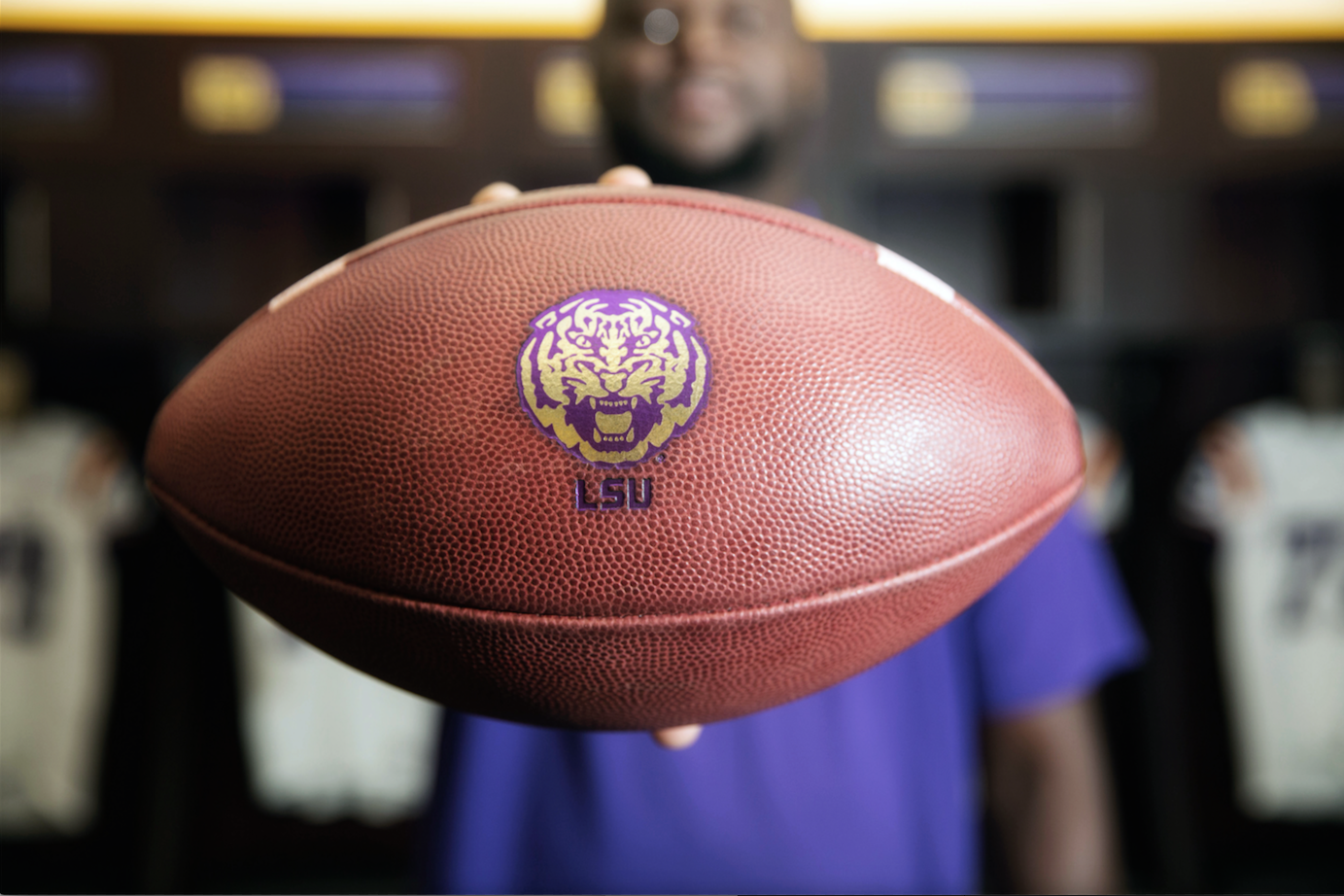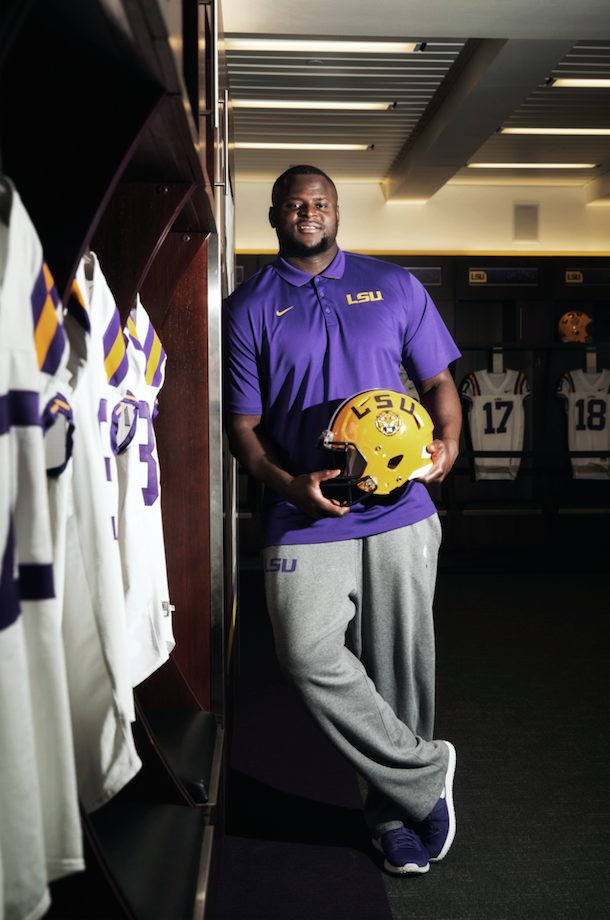Chidi Okeke was just 16 when he left home.
It was 2013, the year his life would change forever. That was the year Okeke moved from Africa to the United States and discovered an entirely new culture—American sports.
Every day he would play soccer outside his home in the streets of Anambra, Nigeria.
He also played basketball and dreamed one day he’d get the chance to play sports professionally.
 He wanted that dream for himself, but also for his family, which had experienced hard times. His father died in a car accident when he was 9 years old. It was just him, his mother and his nine older siblings trying to survive. If he were to make it in sports, he thought, he could eventually take care of them.
He wanted that dream for himself, but also for his family, which had experienced hard times. His father died in a car accident when he was 9 years old. It was just him, his mother and his nine older siblings trying to survive. If he were to make it in sports, he thought, he could eventually take care of them.
The 6-foot-6, 311-pound Okeke is a gentle giant. He is typically more reserved, but when he talks today about his family and where he’s from, you can hear the happiness in his deep voice.
“I love them,” Okeke says in his thick accent. “My family, my friends—that’s home.”
Gifted with raw talent, quality footwork and quickness for an athlete of his size, he was scouted by the Ejike Ugboaja Foundation, a nonprofit organization that has provided educational opportunities for hundreds of young Nigerian athletes in the United States and Nigeria since its inception in 2006.
The foundation aims to offer improved life prospects for up-and-coming generations of Nigerians, helping them achieve success through education and athletics both home and abroad.
It was founded by Ejike Ugboaja, the first African to be drafted to the NBA directly from Africa. Remembering the opportunities he lacked as a young athlete, he was inspired to create the organization the same year he was drafted to the Cleveland Cavaliers.
Hundreds and sometimes thousands of young Nigerians train at the foundation’s sports camp each summer. While Okeke attended the camp in the summer of 2013, leaders there quickly recognized he could be something special. At the end of the summer, he was among a small group chosen to play basketball in the United States at Champagnat Catholic School in Florida.
“The foundation has helped me so much, and it helps so many other kids,” Okeke says. “I’m looking forward to doing the same one day. I want to organize some camps for kids in Nigeria who have no opportunity and give back to my community.”
Okeke knew his transition to living in the United States would not always be easy. He’d have to overcome a language barrier and other cultural differences—it’s a sign of disrespect to look adults in the eyes in Nigeria, for instance. He’d also have to overcome being homesick.
“I miss where I’m from,” he says. “Everyone loves where they are from no matter what.”
To make it in a country across the ocean from his homeland, he knew he’d have to grow quickly from a boy to a man. Somehow, he didn’t let any of the pressure faze him. He kept pushing on, accepting the next challenge.
Once he got to his new school in Florida, both he and his coaches quickly realized he was more suited to play football than basketball. This presented Okeke with one of his biggest challenges yet: learning an entirely new game. Football was a sport he had never played, but his size and athleticism would give him even better opportunities to succeed than he’d had in other sports.
“I’ve been playing sports all my life, so I didn’t feel like football was so new to me,” Okeke says. “Once you’re an athlete, any sport you play, you can actually adapt. If you want to do something, you can do it. That’s my mentality.”
It turns out, his mentality was perfect for football. In the fall of 2013, he switched to the gridiron and never looked back.
 As a senior, he transferred to Faith Baptist Christian Academy in Georgia, where he was considered a five-star prospect by 247Sports. ESPN and Scout had their eyes on him, too, both giving him four stars. He was ranked as high as the No. 2 offensive tackle nationally.
As a senior, he transferred to Faith Baptist Christian Academy in Georgia, where he was considered a five-star prospect by 247Sports. ESPN and Scout had their eyes on him, too, both giving him four stars. He was ranked as high as the No. 2 offensive tackle nationally.
While top-ranked recruits always have many options, Okeke chose to become a Tiger because he admired the established culture at LSU and wanted to be a part of it. Today, he is shining on LSU’s offensive line, and the redshirt freshman continues to work toward one day getting a starting gig at left tackle.
Knowing his time is now to make an impact on the field, he puts work in daily to ensure plenty of playing time in the upcoming season, which Les Miles said will happen. While his coaches see his tremendous potential, they also see an unbreakable spirit. It’s a spirit that can be traced all the way back to Nigeria and his proud family.
“I was young when I left, and they didn’t know how I was going to do over here, so I told them I was OK and everything was good,” Okeke says. “Right now, they’re so happy I’m here and doing what I’m doing.”
He Skypes with his family often, and visits them as much as he can. He went back home earlier this year to enjoy his beloved home and family. And, of course, the food, which is one of the things he misses most.
“I grew up eating Nigerian food, and so I feel it’s better than any other food in the world,” Okeke says.
Now 19, Okeke has been in the U.S. for three years—and he says he doesn’t plan on going anywhere but up.
This article was originally published in the August 2016 issue of 225 Magazine.








